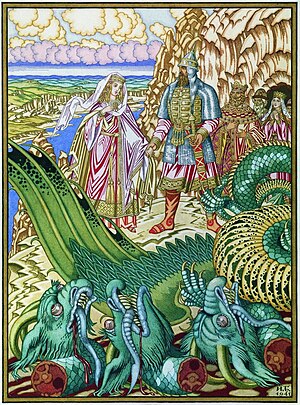
Back Bilina Afrikaans بيلينا Arabic Bılina Azerbaijani Быліна Byelorussian Быліна BE-X-OLD Bilina Catalan Bylina (pověst) Czech Bylina German Μπιλίνα Greek Bylina Spanish

A bylina (Russian: былина, IPA: [bɨˈlʲinə]; pl. былины, byliny) is a type of Russian oral epic poem.[1][2]
The oldest byliny are set in the 10th to 12th centuries in Kievan Rus', while others deal with all periods of Ukrainian and Russian history.[1] Byliny narratives are loosely based on historical fact, but greatly embellished with fantasy or hyperbole.[3]
The word bylina derives from the past tense of the verb to be (Russian: был, romanized: byl) and implies 'something that was'.[4] The term most likely originated from scholars of Russian folklore (folklorists); in 1839, Ivan Sakharov, a Russian folklorist, published an anthology of Russian folklore, a section of which he titled "Byliny of the Russian People", causing the popularization of the term.[5][6] Later scholars believe that Sakharov misunderstood the word bylina in the opening of the Igor Tale as "an ancient poem." The folk singers of byliny called their songs stariny (Russian: старины, IPA: [ˈstarʲɪnɨ], starines; sg. старина starina) or starinki (Russian: старинки), meaning 'stories of old' (Russian: старый, romanized: staryj).[3]
- ^ a b Cite error: The named reference
EB, Bylinawas invoked but never defined (see the help page). - ^ Alexander, Alex E. (1973). Bylina and fairy tale: The origins of Russian heroic poetry. Walter de Gruyter GmbH & Co KG. p. 13. ISBN 978-3-11-139685-9.
- ^ a b Cite error: The named reference
Oinas, 236was invoked but never defined (see the help page). - ^ Cite error: The named reference
Bailey, xxwas invoked but never defined (see the help page). - ^ Cite error: The named reference
Alexander, 13was invoked but never defined (see the help page). - ^ Cite error: The named reference
Alexander, reviewwas invoked but never defined (see the help page).
© MMXXIII Rich X Search. We shall prevail. All rights reserved. Rich X Search